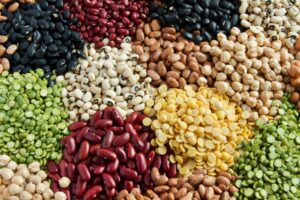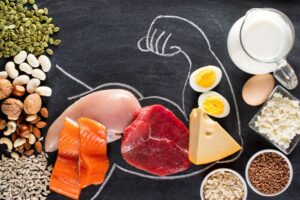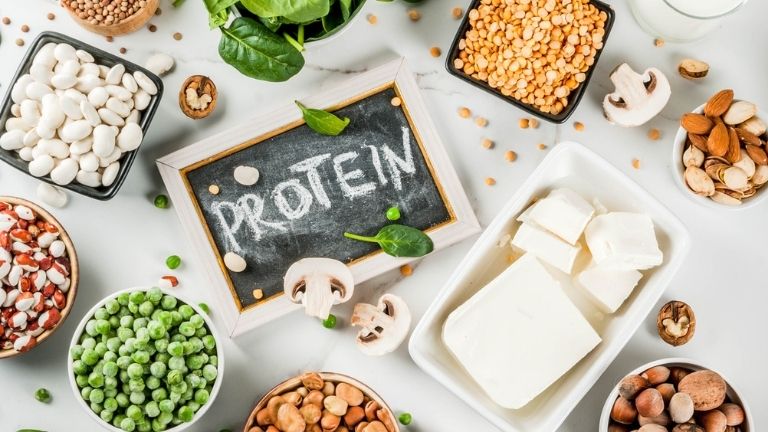‘You can only get your protein from meat’ – we’ve heard all the myths. Nutritionist David Stache reveals 4 protein myths we all need to stop believing
Protein is still a pretty hot topic, protein powder is everywhere and bodybuilders are still boasting about how much steak and chicken they can eat. Most of us know that protein is good for us but many are still unsure why or how much we need.
Protein is an essential nutrient, as it helps our bodies build muscle and produce hormones and anti-bodies.
Protein is still a pretty hot topic
Therefore, it’s imperative that we ensure protein makes up a significant proportion of our diets.
However, it is important to identify the many myths surrounding how much protein we should consume, and where the best source of protein comes from.
To help do this, Healthista caught up with David Stache, Nutritionist for leading sports nutrition brand, Warrior®, who offers his expert advice on how to ensure you are consuming the right protein sources to get the results you are striving for.
MYTH #1: ‘Protein can only be found from one source’
A common misconception about protein is that it can only be found in foods such as meat, fish, and eggs.
Whilst these foods are fantastic sources of proteins, we can also find protein in a variety of other foods, such as dairy, vegetables and cereals.
Soy is a fantastic option (especially if you’re dairy-free), as soy-based foods and drinks can help lower cholesterol and have been said to reduce the risk of heart disease.
Nuts, seeds, beans, and pulses are also a great source of protein, especially if you’re on a meat-free or vegan diet.
Nuts, seeds, beans, and pulses are also a great source of protein
The options are endless when it comes to consuming enough protein, and your daily intake should most definitely not be confined by your lifestyle and choice of diet.
You can also consume protein from convenient snacks. For example, I would recommend trying a Warrior CRUNCH bar or Warrior RAW flapjacks, which contain up to 20g of high-quality milk protein and less than 3g of sugar per bar.

MYTH #2: ‘We all need to consume the same amount of protein’
Just as people of different sizes require a different number of calories per day, the same applies to protein.
According to the British Heart Foundation, most adults will need around 0.75g of protein per kilo of body weight each day. This translates to 45g of protein a day for women and 55g for men.
It is also suggested that seeing whether a protein portion fits into the palm of your hand is a good indication of whether you’re consuming the correct amount of protein with each meal.
most adults will need around 0.75g of protein per kilo of body weight each day
People in different professions and life stages will also require different amounts of protein.
For example, an athlete or bodybuilder will need more protein as it is essential in aiding muscle growth and recovery after a workout. Whereas a pregnant lady or an elderly person have distinct physiological demands which means their protein requirements will be different.
MYTH #3: ‘Protein is only needed for muscle development’
Amino acids are the building blocks of protein and are an important component of muscle, skin, hair, and nails, as well as antibodies, hormones, and cellular structures.
Whilst most of us know that protein can help in muscle development, many do not realise that this is not all it does.
Protein also helps to maintain a healthy immune system, regular blood sugar, and support positive changes in body composition.
For those who find themselves looking to shed fat, protein has also been found to help sustain fat loss, preserve muscle, and give ample recovery support from exercise.

MYTH #4: ‘All plant-based proteins are good for you’
Whilst protein is commonly found in plant-based food, this does not automatically mean that they are a high source.
Plant-based proteins such as hummus, hemp seeds, or avocado supply essential nutrients, however they don’t always provide you with enough protein based on how much you are required to eat in a day.
According to the UK Government Dietary Recommendations, a medium avocado has fewer than 3 grams of protein, and hemp seeds provide only 3 grams of protein per tablespoon. So, adding them on top of your cereal or in your smoothie won’t supply you with sufficient protein.
many plant-based proteins lose their nutritional benefits in the production process
It’s also important to note that many plant-based proteins lose their nutritional benefits in the production process if they’re being used as the base of a mock meat product.
These sorts of products often contain a lot of salt, saturated fat and calories which might outweigh the benefits of getting enough protein.
If you enjoy a meat-free diet, it might be better to replace meat entirely with a healthier, more natural option, such as grains, legumes soy or beans.
More Healthista Content:
5 ways to feel awake and alert EVERY morning
How to eat, exercise and live in sync with your menstrual cycle
How to be successful: 8 ways to master your physical intelligence
Tired all the time? 7 tried and tested ways to improve your snooze
7 osteopath recommended morning stretches to set you up for the day
Like this article? Sign up to our newsletter to get more articles like this delivered straight to your inbox.



















































